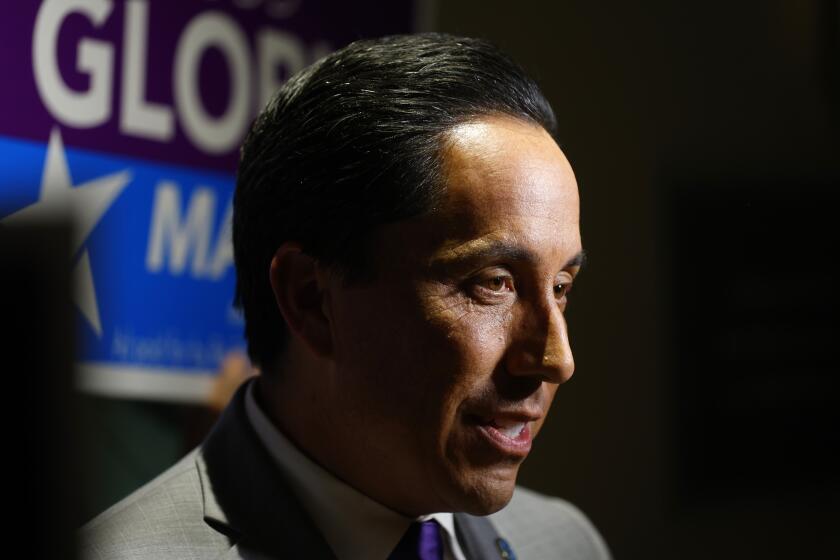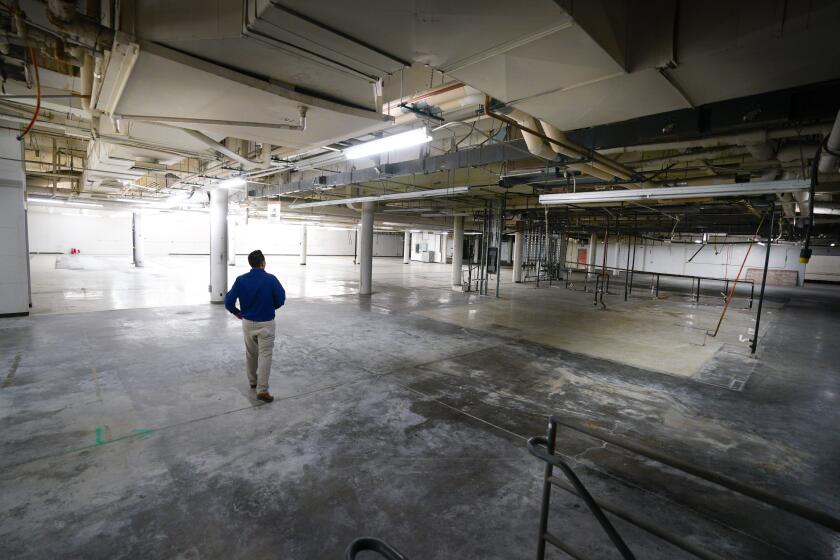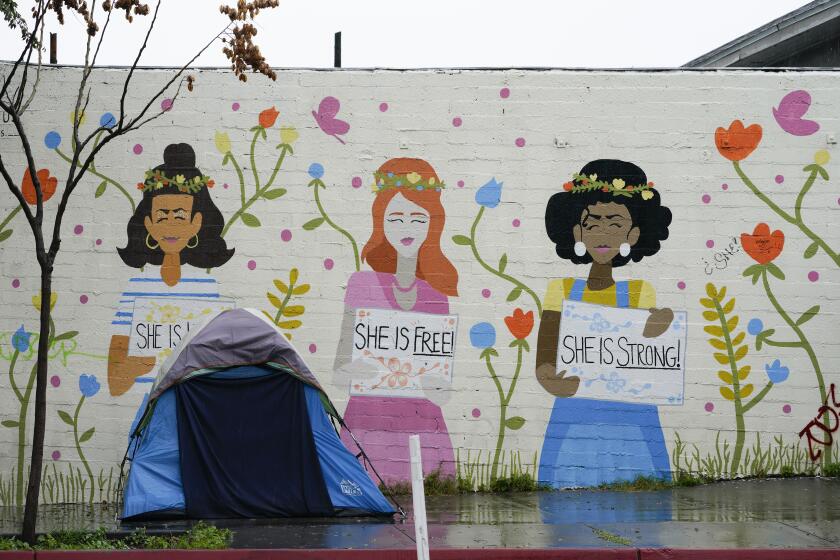Last stop for America’s most complex immigration cases? Congress
America’s immigration system is complex by nature, but some cases are so intricate they require an act of Congress to sort them out. Literally.
Since 1983, members of Congress have intervened in the lives of some 1,900 immigrants, proposing laws specifically to let them into the U.S. Democrats and Republicans alike have used this method, although Democrats about twice as often.
In about 6 percent of the cases, the bills become law, according to a U-T Data Watch review of federal data. Having a bill pending has been a ticket to stay in America for hundreds of immigrants — a situation that’s changing under President Donald Trump. His administration has said a pending bill in Congress will no longer mean the subject of the legislation can stay indefinitely.
The change is likely to dramatically affect the process for hundreds of applicants. Dozens of immigrants who who would otherwise be eligible for deportation have stayed in the U.S. for more than a decade because of a pending bill, the U-T data review found.
One immigrant has been allowed to stay in the U.S. for 19 years because of pending private bills. Corina de Chalup Turcinovic, who lives in a suburb of Chicago, is the subject of special legislation first introduced in 1998. It hasn’t passed, but she has been protected from deportation nonetheless.
Born in France, Turcinovic came to the U.S. unexpectedly when her fiance, who played in the Croatian band Libertas, was on tour and got struck by a car in New Jersey and paralyzed. De Chalup Turcinovic rushed to the U.S. and ended up overstaying her visa while she cared for her fiance. After he died in 2004, she wanted to keep living in the house where they were married and made a life together. Three members of Congress have taken up her cause, most recently Daniel Lipinski, D-Illinois.
Hers is not the only case to be handed down from lawmaker to lawmaker.
Rep. Duncan Hunter, R-Alpine, is sponsoring legislation for the Dunoyer family, whose first bill was introduced by Hunter’s father and predecessor in Congress in 2008.
Immigration and Customs Enforcement in May announced the policy change on private bills. Organizations that support Trump’s immigration policies have criticized private bills for years as a form of congressional earmarking.
Steven Camarota, director of research at Center for Immigration Studies, said that while he thinks the bills can be useful in a tiny subset of circumstances, he would not support giving any relief to people unless the bills actually become law.
“The notion that we’re not going to deport someone because a member of Congress introduced a private bill that almost certainly will not pass is not the way to do it,” Camarota said via telephone. “That’s just gaming the system.”
Proponents say the bills offer a necessary backstop when immigration laws fail to account for worthy circumstances.
“Private immigration bills are a critical safety net that Democrats and Republicans alike have carefully used for a small number of the most critical cases,” Sen. Dianne Feinstein, D-Calif., said in an emailed statement shortly after this year’s policy change.
Carl Balediata, a San Diego immigration attorney who suggested his client Beloved Jefeti request a private bill from Rep. Susan Davis, D-San Diego, said Jefeti is the only person in his 17 years of practice whom he advised to try for a private bill.
“They don’t normally give those out like candy on Halloween or something. It’s a very difficult standard, at least the way I interpret it,” Balediata said. “It’s reserved for those extreme circumstances.”
Duncan L. Hunter, who introduced 13 private immigration bills during his time in Congress, said the bills he sponsored were consistent with his hardline posture on immigration.
“The vast number of those cases turn on some kind of hardship,” Hunter said by telephone. “That’s far and away different from having a secure border that doesn’t allow smugglers to come in.”
Landmine victim
Jefeti, 25, of El Cajon, is in the U.S. on “medical parole” to have reconstructive surgeries on his face after a landmine accident in his native Zimbabwe. Someday he wants to become a police officer or join the U.S. military.
He has been in the U.S. since 2007, and his current permission will expire in January. He hopes he’ll be able to get another extension because his face needs more work.
Jefeti said the only family he has left in Zimbabwe is his younger brother.
“I haven’t been for almost 10 years,” he said. “I don’t know where to go back and start again.”
At 9, Jefeti triggered the landmine while he was playing outside in Epworth, Zimbabwe. It destroyed much of his face, and he spent more than a year in a hospital.
When he returned to school, kids called him Monster.
Already a grade behind from his time in the hospital, Jefeti stopped going.
A charity organization called Operation of Hope took him to Orange County to have surgery when he was 16.
While he was healing, the organization enrolled him in a private Christian school in Mission Viejo.
He went back to Zimbabwe briefly for about a month in 2008, and then Operation of Hope brought him back again planning for more surgery. In September of that year, he was featured in People magazine.
He moved in with the Tinneys, a Mission Viejo family whose children attended his school. His host brother Trevor, then 14, helped him get ready for prom, an outing that was covered by local media.
When the Tinneys moved to San Diego, they wanted to bring Jefeti with them. Eventually, they were able to do so. They found him a private tutor and a new charity group to continue working on his facial reconstruction.
He’s had numerous surgeries with Fresh Start, and said he needs more to help his lip stay in the right position.
Through a private home-schooling program with his tutor, he went from elementary school to graduating high school in less than four years. Now he has almost finished an associate’s degree in political science at Grossmont College.
His host sister, Grace Tinney, said she finds inspiration in Jefeti’s work ethic.
“I’ve never seen someone so eager to do schoolwork or just going to his job and making sure his uniform is perfect,” she said. “It’s motivating.”
Marriage mixup
Immigration officers came for Flavia Cahoon in 2005, and only a private bill from then-Congressman Bob Filner kept her from being deported to the Philippines. Davis has stayed with the case. Under the new Trump administration rules, Cahoon’s last postponement will run out in September.
Davis has never met Cahoon, but she was moved by her story when she inherited the case from Filner.
“It was such a good example of our flawed immigration system, a woman who was working hard in the community, doing everything right,” Davis said via telephone.
Cahoon, 56, of Paradise Hills, is supported in her effort to stay by her husband, Albert, 66, and others. After she came to the U.S., she worked as a nurse, caring for children with special needs as well as elderly patients, and many of those whose lives she touched have written letters on her behalf.
Krystin George, whose mother and mother-in-law were Cahoon’s patients, said Cahoon is the kind of immigrant that Americans should want to stay in the country.
“I would be really ashamed that we had let that happen as a country,” George said. “We should be better. Our government should be better.”
The trouble started in 1992. Cahoon had an American fiance and applied for a visa based on that relationship. Immigration officials believe Cahoon lied on the application by saying she was single at the time.
Cahoon said she told the truth, that marriage documents on file in the Philippines involving a previous relationship were fraudulent. She says the papers carried a signature that wasn’t hers — and the man in question was already married.
She and her American fiance got married, but the relationship ended amid the immigration battle. Officials eventually told Cahoon that she had to leave the U.S. She stayed, becoming an unauthorized immigrant.
Now a single mother with no driver’s license, Cahoon worked to provide for her daughter, Jane. She walked miles to multiple jobs and supported her daughter’s talents with soccer.
While she was working at a coffee shop, she met Albert Cahoon, who was a customer there. They married.
The Cahoons tried to straighten out Flavia’s immigration situation as many times as they could, unsuccessfully.
Her daughter remembers vividly when Filner’s private bill pulled her out of immigration detention. She was still a student at University City High School and playing on the school soccer team.
Her mother never missed a game, except for the weeks she spent in immigration detention, and she was always the loudest one in the stands.
When her mother came to the team’s first game after she got out, they didn’t tell her teammates ahead of time. The players lined up on the field, and as the game kicked off, everyone heard Flavia Cahoon’s distinctive cheer resound from the stands.
The entire team stopped and ran to her. Officials had to pause the game while the team celebrated Cahoon’s return.
“It was almost like a movie,” her daughter, now Jane Calloway, said.
Albert Cahoon said his wife’s deportation would affect far more people than just her or even their immediate family. She is active at their church both in the choir and on the cleaning crew. She cares for her granddaughter while her daughter and son-in-law, who both serve in the Navy, are at work.
“The idea that our country will be better or safer if she’s deported is bogus,” he said. “It eats at me.”
Their doormat, which Flavia Cahoon picked out, reads, “Proud Americans live here.”
Follow me on Facebook for live updates about immigration news
kate.morrissey@sduniontribune.com, @bgirledukate on Twitter
Get Essential San Diego, weekday mornings
Get top headlines from the Union-Tribune in your inbox weekday mornings, including top news, local, sports, business, entertainment and opinion.
You may occasionally receive promotional content from the San Diego Union-Tribune.











